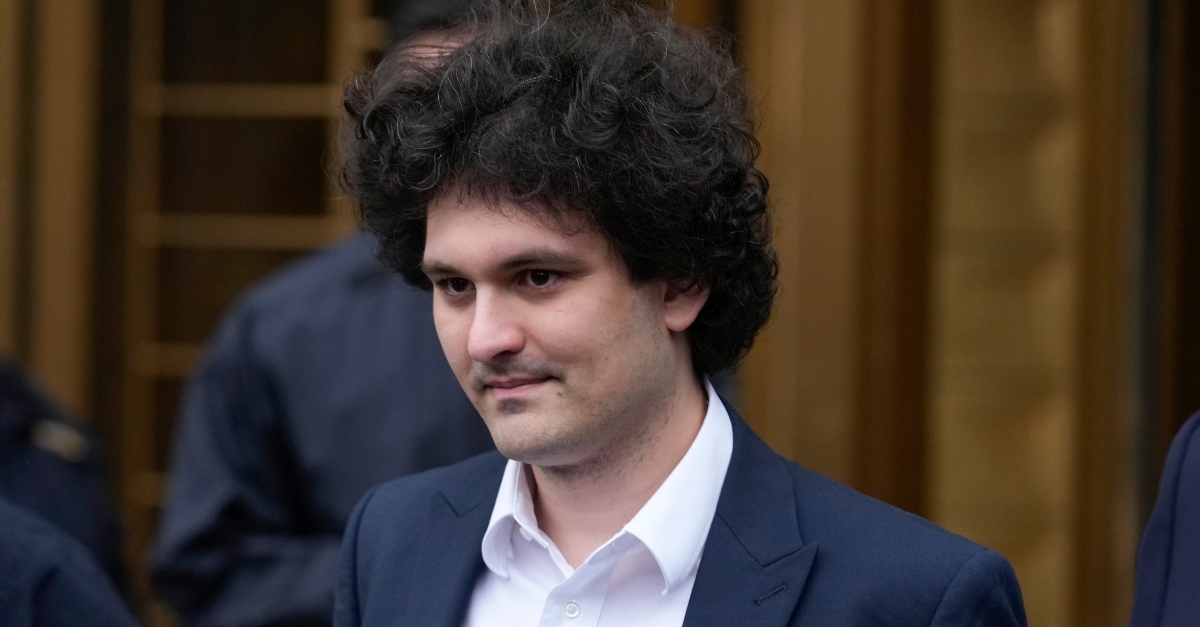
Samuel Bankman-Fried leaves Manhattan federal court in New York, Tuesday, Jan. 3, 2023. Bankman-Fried pleaded not guilty to charges that he cheated investors and looted customer deposits on his cryptocurrency trading platform as a judge set a tentative trial date for October. (AP Photo/Seth Wenig)
Prosecutors want to clamp down on fraud defendant and cryptocurrency businessman Samuel Bankman-Fried, 30, speaking to employees and former employees at his companies except under the presence of counsel, or using any “encrypted or ephemeral call or messaging” applications. Writing to Judge Lewis Kaplan on Friday, they claim he reached out to a potential witness in his case, possibly to influence the man’s testimony.
“I would really love to reconnect and see if there’s a way for us to have a constructive relationship, use each other as resources when possible, or at least vet things with each other,” Bankman-Fried allegedly wrote on Jan. 15.
Prosecutors argued he might have been trying to influence this person’s potential testimony and get this person on his side.
This individual, “Witness-1,” has a firsthand account of Bankman-Fried’s actions under the charged conspiracies, prosecutors said. Authorities only identified him as the current General Counsel of FTX US, but Ryne Miller currently holds the position. Bankman-Fried stepped down as FTX CEO in November when the company filed for bankruptcy.
According to prosecutors, Witness-1 participated in Signal and Slack communications in which Bankman-Fried ordered that Alameda investments be liquidated to cover customer withdrawals in FTX, and that Bankman-Fried indicated moving $45 million of Alameda money to FTX US to cover an apparent hole in that company’s balance sheet.
“Since FTX’s collapse and his arrest, the defendant has publicly touted that FTX US was fully solvent and claimed that it is ‘ridiculous that FTX US users haven’t been made whole and gotten their funds back yet,’ without disclosing his transfer of Alameda funds to fill an apparent hole in FTX US’s balance sheet,” prosecutors said.
Prosecutors claim Bankman-Fried had a history of hiding information. For example, ordering that Slack and Signal communications between FTX and Alameda employees, including his communications, be scheduled to autodelete after 30 days or less.
“The Government has learned from Caroline Ellison—the former CEO of Alameda who has pleaded guilty to a cooperation agreement with the Government—that the defendant indicated, in substance and in part, that many legal cases turn on documentation and it is more difficult to build a legal case if information is not written down or preserved,” prosecutors said.
The defense claimed the government raised its concerns about Witness-1 on Jan. 19 and both sides had been sorting it out. They asserted prosecutors only raised their concerns about the use of Signal and other apps on Friday afternoon.
“But rather than wait for any response from the defense, the Government sandbagged the process, filing this letter at 6:00pm on Friday evening,” the defense wrote. “The letter conveniently omits any reference to the entire process, nor does it mention the defense’s written proposal, making a mockery of the meet-and-confer process. The reason is obvious. The Government apparently believes that a one-sided presentation – spun to put our client in the worst possible light – is the best way to get the outcome it seeks, even if it does not present the full context to the Court.”
As for Bankman-Fried’s message to Witness-1, they assert there is an innocent explanation to it.
“Although the Government seeks to characterize our client’s email as a sinister attempt to influence Witness-1’s potential testimony, the email is more reasonably read as another attempt by Mr. Bankman-Fried to offer his assistance to FTX ‘as a resource,'” the defense wrote. “We further noted that neither Mr. [John Ray, “CEO of the FTX Debtor entities”] nor Witness-1 had responded to our client.”
Ray did not become CEO until the bankruptcy filing, so he was not a “percipient witness regarding any of the events alleged in the indictment,” they said.
They said that the message to Witness-1 was not deleted, did not have any auto-delete functionality, and was “simultaneously sent over email.” They want him to be able to have unlimited contact with certain people outside of the presence of counsel. That includes foreign regulators who contact Bankman-Fried or any person those regulars ask him to contact.
They also want him to be able to contact most FTX employees and former employees without counsel unless otherwise specified.
“Each of these current and former employees could have information crucial to Mr. Bankman-Fried’s defense,” they wrote. “Requiring Mr. Bankman-Fried to include counsel in every communication with a former or current FTX employee would place an unnecessary strain on his resources and prejudice his ability to defend this case. Moreover, many of these individuals are Mr. Bankman-Fried’s friends. Imposing a blanket restriction on his contact with them would remove an important source of personal support.”